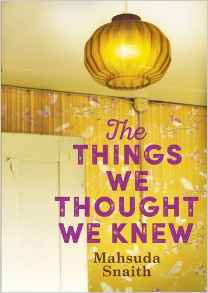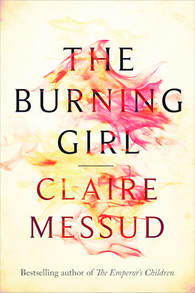The Things We Thought We Knew by Mahsuda Snaith
As she looks back on her childhood in the Leicester tower block with her friend, Marianne, and her bossy older brother, Jonathan, the author invites the reader to speculate on the trauma that has triggered her retreat from the world. Is it attributable to Marianne’s disappearance, or do the roots lie in her relationship with her mother, a feisty character who, despite the challenges of poverty, racism and dislocation from her own roots in rural Bangladesh, has faced single parenthood with aplomb.
I’d been looking forward to Mahsuda Snaith’s debut since we met at a writing workshop in Leicester led by Bernadine Evaristo a few years ago. She’d just acquired an agent, having come second in the Mslexia Novel Writing Competition (in which I’d only reached the long list), so it’s great to see Doubleday (who provided my review copy) bringing her words to the world. I must admit I found the tone a little light for my taste, although I loved the language of the sparky opening and must also applaud the fictional depiction of both chronic pain syndrome and ordinary South Asian family life.
The Burning Girl by Claire Messud
Best friends since nursery school, Julia and Cassie spend every day together the summer they’re twelve: baking cakes and listening to music; volunteering at a cat and dog shelter; swimming in a neighbour’s pool and in a quarry; spooking each other in a derelict mental hospital. But when they return to middle school, their relationship begins to change. Julia, relating this novel from her late teens, joins the more academic classes, and is deeply hurt when Cassie befriends a showy new girl, Delia, with “a way of glancing at boys out of the corner of her sleepy almond eyes as if she were … starring in a TV show invisible to anyone but herself” (p68). Almost as bad, Cassie becomes more than friends with Peter, a boy in the year above whom Julia has always fancied.
There are changes afoot for Cassie at home also when her mother becomes involved with Anders Shute. Julia knows that her friend resents his presence in the home Cassie and her mother have shared since her father died when she was a baby but, now the pair no longer swap secrets, she can’t judge how creepy Anders really is. Julia’s new friends in the public speaking contests, as well as her teachers’ and middle-class parents’ expectations for her future, further distance her from Cassie. But when Cassie goes missing, Julia wonders if she ought to have done more. In the end, Julia is so disturbed by what happened to Cassie, and by the demise of an important friendship, she is seeing a therapist (p194-6), albeit an ineffectual one, as fictional therapists all too often are.
I was keen to read The Burning Girl after enjoying Claire Messud’s previous novel, The Woman Upstairs. While I admired the writing immensely, and liked the story, its deeper themes – of female vulnerability, survivor guilt and the impossibility of ever fully knowing another person – didn’t resonate for me. But they might for you, although I wouldn’t recommend this novel if you dislike loose ends. Claire Messud has chosen to leave the reader in a similar position to Julia in not knowing for sure what went wrong. Thanks to Fleet for my review copy.























 RSS Feed
RSS Feed





















